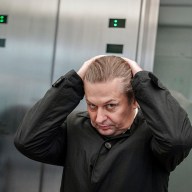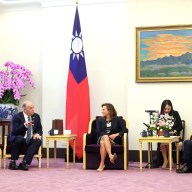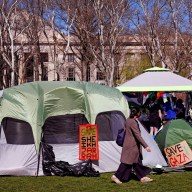The Tribeca Film Festival is not just a film festival. For one thing it’s no longer just about film. The lines between movies and TV, as well as burgeoning alternative forms of visual storytelling, have started coming down. In addition to several dozen films, this year’s fest, which runs from Apr. 13 through Apr. 24, includes sidebars on television, installations and a new “Virtual Arcade,” devoted to immersive experiences. Film festivals have to change with the times, and Tribeca is doing just that. RELATED: 12 fillms to see at this year’s Tribeca Film Festival For another, the TFF is also about what first inspired it: helping the continued revitalization of not only its home neighborhood but the whole of Lower Manhattan. The festival was founded in 2002 by filmmakers Jane Rosenthal and Robert De Niro plus real estate maven Craig Hatkoff (and the former’s husband) in part as a response to the attacks of September 11. Rosenthal and De Niro remember the aftermath: streets covered in dust, tanks rolling down Canal Street, sirens blasting. The community came together to rebuild. “It was like, ‘What do you do as filmmakers?’” Rosenthal recalls thinking. Creating a festival, she says, was a natural instinct.”
Since its first festival in 2003, the TFF has watched as Lower Manhattan has thrived. Since 2011 over 30,000 new residences have been built. Restaurants and bars abound, and even the Financial District, once a ghost town after dark, has started to gain a night life. RELATED: New on Netflix: “Erin Brockovich,” “The Right Stuff,” “Stray Dog” The TFF too has changed. “The first festival we were carrying film cans,” Rosenthal remembers. “Now everyone’s streaming. Technology has changed the way we view new content and where we see it. To us, we’re a festival about stories. We’re agnostic, to a certain extent, about what screen size it’s on.” That’s why a chunk of the festival is devoted to “new media.” Along with the Virtual Arcade — where you can see new immersive and VR work from people who’ve worked for Pixar and Dreamworks Animation — there’s “Storyscapes,” which is devoted to installations. Among these are “Seances,” which includes a nested series of stories by Guy Maddin (“The Forbidden Room”), and “SENS,” which replicates the experience of going blind, thus awakening other senses. Having a TV section might sound dodgy — a kowtow to how television is now in some ways more powerful than film. But the sidebar is about more than showing off the season finale of “Broad City” or one of the final episodes of “The Good Wife” (along with a discussion with Juliana Marguiles and more). “You have such fans and such amazing people working in television. Let’s see that in a communal environment,” Rosenthal explains.
Of course, let’s not neglect the movies. There are tons of them, spanning new fiction features to documentaries to shorts, the latter, Rosenthal points out, currently in a heyday thanks to YouTube, Amazon and Hulu. There are big gets, like the sci-fi indie “Equals,” starring Kristen Stewart and Nicholas Hoult, and “A Hologram for the King,” a European production starring Tom Hanks. There are local connections, such as “Jeremiah Tower: The Last Magnificent,” a doc on the celeb chef, and “Contemporary Color,” an immersive concert film shot at the Barclays Center last summer, featuring David Byrne, St. Vincent, Nelly Furtado, Ad-Rock and Ira Glass. There’s a film directed by Demetri Martin (“Dean”), a Ricky Gervais comedy (“Special Correspondents”), a crazy James Franco movie about porn (“King Cobra”) and a doc about eating bugs (“BUGS”). RELATED: Interview: Helen Mirren talks “Eye in the Sky,” drones, feminism and Jennifer Lawrence The documentary section has always been among the most reliable parts of the TFF, with films that are both daring in subject matter and often in form. This year the initial slate arguably went too far: Buried in there was “Vaxxed: From Cover-Up to Catastrophe,” an anti-vaccination doc made by Andrew Wakefield, the former physician who started the movement with a since discredited 1998 paper. De Niro himself spoke out about his wish to include it because he has a son with autism, not because he’s against vaccinations himself. He wanted to start discussions. Instead he had the film pulled from the festival. (It since opened for a two-week run at the Angelika Film Center.) “To me it was worth seeing, but I didn’t want to make this whole production about it,” De Niro tells us. “I don’t know enough about it. I know that I saw this documentary and there were questions I had that would have been worth asking. But there was a problem with the filmmaker that became an issue.” RELATED: Interview: Sam Rockwell talks “Mr. Right” and keeping your body moving However misjudged that move was, it could be argued the film at least spiritually fit in with the festival’s habit of screening docs meant to start debates about key issues. This year’s slate still includes films on solitary confinement (“SOLITARY”), drone warfare (“National Bird”), arms (“Shadow World”), political satire in Egypt (“Tickling Giants”) and the militarization of police (“Do Not Resist”). These are just a handful of the many diamonds waiting in the rough, ready for hungry audiences. Besides, Rosenthal points out, “Film festivals are the original binge-watching.”
Robert De Niro and Jane Rosenthal talk Tribeca and the anti-vax doc
Follow Matt Prigge on Twitter @mattprigge


















